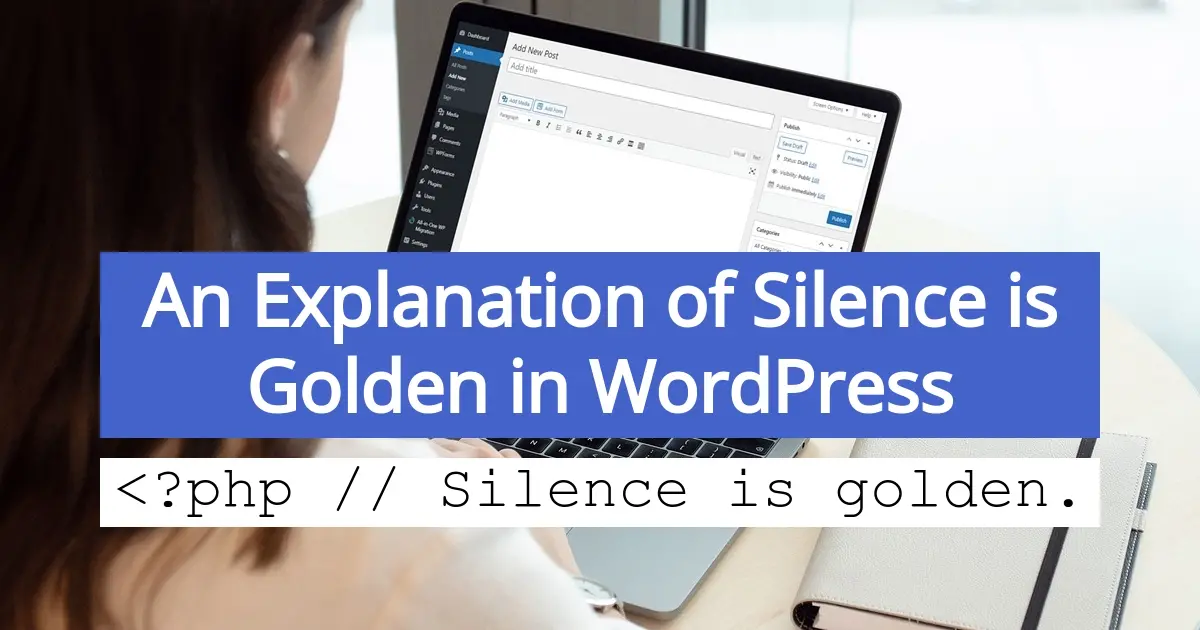If you’ve ever browsed through WordPress core files, you might have seen a mysterious line: Silence is golden.
This simple statement often appears in seemingly empty PHP files. But what does it actually do, and why is it there?
In this article, we’ll explain what “Silence is Golden” means in WordPress, why it’s used, and whether it should be enabled or removed.
Silence is Golden - What is that?
In WordPress, "Silence is Golden" refers to a practice where certain PHP files - like index.php files inside plugin or theme directories - contain a single line of code:
<?php // Silence is golden. ?>
This line prevents unauthorized access to directories by making the file intentionally empty. When someone tries to access a directory directly (like yourdomain.com/wp-content/plugins/), WordPress serves a blank page instead of exposing the file structure or triggering PHP errors.
While it doesn’t suppress all PHP warnings or server errors site-wide, it’s a simple way to protect specific folders from being browsed or executed directly - especially if directory listing is enabled on your server.
It’s not a core PHP directive, but a WordPress convention used for basic directory protection.
Origin of “Silence is Golden”
The phrase “Silence is golden” is an old proverb meaning it’s sometimes better to stay quiet than to speak. It was often used to encourage thoughtful speech and discourage saying something that might later be regretted.
Its origins trace back to ancient Egypt, where it was a warning against gossip. The phrase also appeared in Greek and Roman texts and was referenced by philosophers such as Plato and Aristotle. A more familiar version, “Speech is Silver, Silence is Golden”, is thought to have originated in 9th-century Arabic culture and was later adopted into Italian proverbs.
So, what does this have to do with WordPress? In this context, the phrase is taken literally.
WordPress uses it in empty files as a way to quietly block access or prevent directory exposure—serving silence for security.
What Does “Silence is Golden” Do?
In WordPress, many index.php files contain a single line of code:
<?php // Silence is golden.
This file acts as a placeholder to prevent direct access to folders like wp-content/, plugins/, or themes/. When someone tries to visit one of these folders in a browser, the server returns a blank page instead of exposing the directory contents or triggering a PHP response.
Blocking Errors from Public View
PHP error messages can sometimes display directly in the browser. If WordPress or a plugin throws a warning, it might reveal technical details—like file paths or plugin versions—which could help attackers.
Silence is Golden helps reduce this risk by ensuring those directories don't respond with error output at all.
Performance and Resource Load
Displaying errors takes resources. WordPress may query the database and load templates just to output a warning. By serving a blank file, Silence is Golden avoids this overhead, saving server power and improving performance during error conditions.
Where You’ll Find the Directive
You’ll usually see // Silence is golden. in the index.php files inside most WordPress subdirectories. The only exception is the top-level index.php, which loads the WordPress front-end.
If you see anything more than this one line in a folder-level index.php, it could indicate injected code or malware.
Using WP_DEBUG as an Alternative
You can also control error visibility using the WP_DEBUG constant in wp-config.php:
define( 'WP_DEBUG', false );
Setting it to false hides PHP warnings and errors site-wide. For development, switch it to true to troubleshoot issues more effectively.
When You Might Disable Silence
You may need to bypass Silence is Golden during development or advanced debugging. In those cases, it’s better to log errors to a file using WP_DEBUG_LOG rather than display them to users.
Keep It in Place
In most cases, you should leave the directive as-is. It’s a simple, no-overhead way to protect your WordPress file structure and suppress unnecessary output in sensitive folders.
If the file ever includes unexpected code, review it immediately - it may signal a compromise.
Pros and Cons of the Silence is Golden
While you’ve learned about the Silence is Golden PHP directive, as well as the origination of the phrase, and a brief intro of its uses, to sum whether you should use it or not, here are some pros and cons.
Pros
Cons
Pros of using the Silence is Golden directive
- Improves security
When you enable Silence is Golden, you can prevent displaying errors and warnings, which WordPress is less likely to be exploited by malware and hackings.
- Improves performance
The Silence is Golden directive ensures that WordPress, both the admin area and frontend of the website will load faster, instead of being slowed down while generating errors and warnings.
- Makes it easier to debug problems
When experiencing problems with your WordPress website, like an update didn’t do well or there’s a conflict of a plugin or theme, disabling the directive will allow you to troubleshoot and fix the issue.
Cons using the Silence is Golden directive
- Can possibly make it difficult to debug problems
When you have the Silence is Golden PHP directive enabled, you might find it difficult to see what errors are happening that will tell you in general where to troubleshoot the issue.
In Summary
When it comes to security and performance, you may find the Silence is Golden directive in WordPress a pretty useful tool. If you’re a beginner user, this may still be a bit much, especially if you’re still learning how to troubleshoot WordPress. However, as you get more comfortable with managing your WordPress site, hopefully this article has helped explain well about the directive so you can make an informed choice of whether to enable or disable it.
Frequently Asked Questions
How secure is PHP?
PHP has an excellent security reputation and the developers are constantly making updates. Plus, you’ll benefit from additional security measures for your site by opting for a managed hosting package.
Can I contact the PHP developers?
Not directly, however, over on PHP.net you’ll find an extensive range of patch update information, forums, and articles that will answer the majority of your technical questions.
Who is responsible for PHP bugs and security issues?
Any fixes will primarily be covered by the PHP developers, and regular updates are pushed out. Under a managed hosting solution, Verpex will make sure any updates are applied to your site as soon as they’re ready.
What content management sytems use PHP?
All of the most popular content management systems are compatible with PHP including, WordPress, Joomla, Drupal, and Magento

Nile Flores is a long time professional blogger, as well as WordPress website designer and developer from the St. Louis Metro East. Nile blogs at NileFlores.com, where she’s passionate about helping website owners, whether they’re small business owners or bloggers. She teaches about Blogging, Social Media, Search Engine Optimization, Website Design, and WordPress. Additionally, Nile loves to speak at WordCamps (WordPress conferences) across the United States. When Nile isn’t knee-deep in coding, she’s a proud mom of a college student, and enjoys oil painting, cigar smoking, nail art design, and practicing traditional Okinawan kempo karate.
View all posts by Nile Flores




















